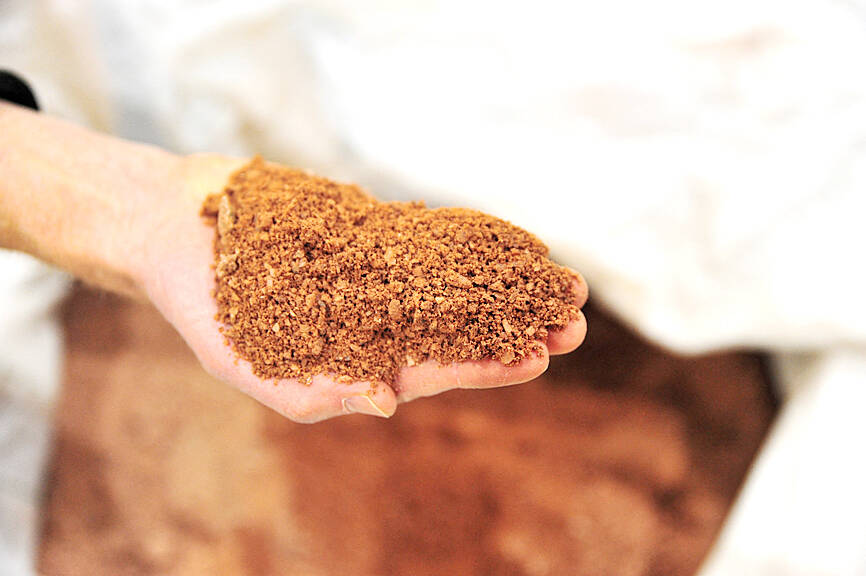Canada is making it harder for foreign firms to acquire domestic mining companies by imposing measures that could protect top takeover targets from large global rivals.
The Canadian government would only approve foreign takeovers of Canadian mining companies “in the most exceptional of circumstances,” the latest guidelines from Canadian Minister of Innovation, Science and Industry Francois-Philippe Champagne showed.
The directive issued on Thursday is part of a sweeping effort by Canadian Prime Minister Justin Trudeau’s government to protect the nation’s critical minerals sector and national security interests.

Photo: Reuters
The move appears to insulate domestic companies from takeovers when the world’s biggest mining firms are hunting for metals that underpin the global transition away from fossil fuels. Industry giants such as Glencore PLC, BHP Group Ltd and Rio Tinto PLC have all sought to boost exposure to metals like copper through major, transformational acquisitions.
Canadian mining firms, in turn, have become appealing targets. Teck Resources Ltd spent much of last year fending off Glencore’s US$23 billion takeover attempt before the Swiss company opted instead to just buy the company’s steelmaking coal business. The Canadian federal government approved the US$6.9 billion deal on Thursday, while also setting new criteria for future foreign mining deals.
“This high bar is reflective of the strategic importance of Canada’s critical minerals sector and how important it is that we take decisive action to protect it,” Champagne said in a statement.
Teck is one of the few large Canadian metals producers that survived a wave of industry takeovers, even though it has long been coveted by foreign competitors for its copper and zinc assets spread across the Americas. The Vancouver-based company is widely expected to become an acquisition target when founder and top investor Norman Keevil gives up control of the company in the coming years.
“Essentially they are saying to Glencore, don’t bother coming back for the other half of Teck,” said Canadian mining financier Pierre Lassonde, who launched a competing bid for Teck’s coal assets last year. “It looks to me like Ottawa is prepared to ring-fence the Canadian critical metals industry with this new directive.”
The new directives go even further than a crackdown on foreign takeovers from state-owned entities that began in October 2022.
Champagne’s ministry has thwarted several recent attempts by Chinese companies to make inroads in Canada’s critical minerals sector through takeovers or major investments.
However, Thursday’s comments signal that the federal government is weary of foreign takeovers even from companies in friendly nations.
Canada’s crackdown could also constrict access to capital for companies that rely on foreign investment to fund exploration and mining projects. The government is “limiting” funding to the industry with their “more aggressive statements,” National Bank of Canada metals and mining analyst Shane Nagle said. “If that’s going to be challenging to do, they’ll just go elsewhere.”

DIVIDED VIEWS: Although the Fed agreed on holding rates steady, some officials see no rate cuts for this year, while 10 policymakers foresee two or more cuts There are a lot of unknowns about the outlook for the economy and interest rates, but US Federal Reserve Chair Jerome Powell signaled at least one thing seems certain: Higher prices are coming. Fed policymakers voted unanimously to hold interest rates steady at a range of 4.25 percent to 4.50 percent for a fourth straight meeting on Wednesday, as they await clarity on whether tariffs would leave a one-time or more lasting mark on inflation. Powell said it is still unclear how much of the bill would fall on the shoulders of consumers, but he expects to learn more about tariffs

NOT JUSTIFIED: The bank’s governor said there would only be a rate cut if inflation falls below 1.5% and economic conditions deteriorate, which have not been detected The central bank yesterday kept its key interest rates unchanged for a fifth consecutive quarter, aligning with market expectations, while slightly lowering its inflation outlook amid signs of cooling price pressures. The move came after the US Federal Reserve held rates steady overnight, despite pressure from US President Donald Trump to cut borrowing costs. Central bank board members unanimously voted to maintain the discount rate at 2 percent, the secured loan rate at 2.375 percent and the overnight lending rate at 4.25 percent. “We consider the policy decision appropriate, although it suggests tightening leaning after factoring in slackening inflation and stable GDP growth,”

Meta Platforms Inc offered US$100 million bonuses to OpenAI employees in an unsuccessful bid to poach the ChatGPT maker’s talent and strengthen its own generative artificial intelligence (AI) teams, OpenAI CEO Sam Altman has said. Facebook’s parent company — a competitor of OpenAI — also offered “giant” annual salaries exceeding US$100 million to OpenAI staffers, Altman said in an interview on the Uncapped with Jack Altman podcast released on Tuesday. “It is crazy,” Sam Altman told his brother Jack in the interview. “I’m really happy that at least so far none of our best people have decided to take them

PLANS: MSI is also planning to upgrade its service center in the Netherlands Micro-Star International Co (MSI, 微星) yesterday said it plans to set up a server assembly line at its Poland service center this year at the earliest. The computer and peripherals manufacturer expects that the new server assembly line would shorten transportation times in shipments to European countries, a company spokesperson told the Taipei Times by telephone. MSI manufactures motherboards, graphics cards, notebook computers, servers, optical storage devices and communication devices. The company operates plants in Taiwan and China, and runs a global network of service centers. The company is also considering upgrading its service center in the Netherlands into a